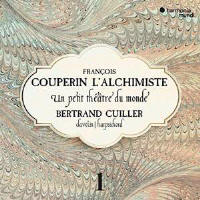Texte paru dans: / Appeared in: Harmonia Mundi |
|
|
Outil de traduction ~ (Très approximatif) |
|
|
Reviewer: Barry
Brenesal This is the start, not merely of a new series devoted to François Couperin’s complete harpsichord music, but also, according to Harmonia Mundi’s marketing blurb on the release, an undertaking that will include “an extensive selection” of vocal pieces, chamber music, and his organ Masses. Bertrand Cuiller was presumably chosen for this first release not merely because of his visibility as a respected harpsichordist, but also because some of the composer’s keyboard music remains his best-known work. The choice of ordres in this two-disc set, however, seems entirely personal: the 11th, 27th, and 19th on one CD, with the 4th, 3rd, and 20th on the second. Perhaps they’ll be issued in a complete set at some point in properly ordered jewel boxes, one book per box, as has occurred with Olivier Baumont’s recording issued two decades ago (Erato 573648).
Only the fourth of Couperin’s
four books featuring Baumont was reviewed by Fanfare. Tom Moore (in
16:4) was pleased with the result, nothing “occasionally a dance will lack
the bravura sweep in the rhythm that it seems to call for,” but that his
handling of agogics was natural, fitting “the rise and fall of the phrases
and their connections with each other.” That bravura he wanted in Baumont is
certainly present on Cuiller’s initial recording, and in spades.
“Saillie”—which Philippe Beaussant wrote of in his book on the composer’s
works as “a mischievous piece with agile counterpoint, imitation, and an
undulating bass”—capers nicely. Granted, this isn’t a dance—not that the
27th ordre has any—but the pair of courantes from the third ordre
have a majestic sweep, while the 20th ordre’s “La boufforme,” marked
gaillardement, is as witty and “full of surprises” as Beaussant
indicates.
Cuiller’s tempos are generally
faster than those of Baumont, though never so fast that they prevent the
performer from including Couperin’s ornaments. His application of agogics
sounds natural, and he remains sensitive to such markings as
gracieusement (“Les laurentines”), and languissamment (“Les
regrets”). You can’t languish quickly, it just doesn’t work; and Cuiller
manages it well, at a moderate pace, with a theme that lingers in the right
hand even as the left continues to steadily mark the progression of time.
Baumont used multiple
instruments on his recording, though they shared a well-defined sound, a
moderate size, and a preference for slight decay, all of which his
engineering complemented. Cuiller may use more harpsichords in future
releases, but this set has just one: a modern instrument by Phillippe Humeau,
after an anonymous 17th-century French model, with a ravalement as
recent as 2006. It sounds relatively large, with a longer decay. Cuiller
doesn’t make much of varying notes in the bass to point or smooth rhythms,
which Baumont does; but there’s no sense of smearing at Cuiller’s faster
tempos—not even at the conclusion of the 11th ordre, the rout of the
“Grand and Ancient Minstrelsy,” which I’ve seldom heard taken quite so
quickly and raucously, nor to such excellent effect. There are no notes enclosed that explain the titles of the various character pieces—just an interview with Cuiller, and one of those essays beloved by French and Franco-Flemish academicians that tend forever to elaborate upon a poetic metaphor which deserves a sentence at most. (Hence the title of this release, Couperin l’Alchimiste: Un petit théâtre du monde.) The sound quality is excellent, close without any attendant noise. This release draws even in my opinion with Baumont. He is more thoughtful, and brings out the intimacy of Couperin’s slower pieces better. Cuiller’s wit and vigor are as theatrical as one could wish in the more extrovert selections, without ever losing sight of the composer’s ornamentation and supple phrasing. Strongly recommended. | |
|
|
|
|
|
|
|
Cliquez l'un ou l'autre
bouton pour découvrir bien d'autres critiques de CD |
|




